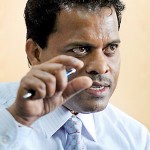News
Dept. claims coral, beach defence plans in hand
Plans to protect threatened beaches and corals have been drawn up by the Coastal Conservation and Coastal Resources Management Department.
The department’s new Director-General, Prabath Chandrakeerthi, said officials had already completed a project to prevent beach erosion at Unawatuna and plans to apply the same technique to Marawila area after finding massive coastal erosion taking place there.

Unawatuna beach was facing heavy erosion due to a breakwater built by a previous government politician to protect his hotel
He explained that Unawatuna beach, which was known as the seventh most beautiful beach and coral reef in the world, was facing heavy erosion due to a breakwater built by a previous government politician to protect his hotel.
The breakwater divided the reef, causing deposits of sand to be deposited on the coral.
Mr. Chandrakeerthi said the department had identified the problem and instituted a “sand nourishment” programme in which sand was extracted from the seabed 20km offshore and laid along the depleted Unawatuna beach.
He said that Marawila area was also experiencing large-scale erosion and a similar sand nourishment programme would be carried out there.
Mr. Chandrakeerthi also said the Kalpitiya coral reef and fish were facing grave danger due to dangerous fishing activities such as anchoring on the reef, bottom trawling and the use of dynamite. These methods were destroying the local eco-system.

Prabath Chandrakeerthi
He said it was very difficult to restore coral reefs when damaged and the only option was to grow coral polyps in artificial cement blocks and transplant them to the reef. He said approval had been given to grow coral around the island.
“Clear water and good sunlight is needed to grow coral,” he said.
“We are also approved measures to give our expertise to a project of planting coral in north and east where the tsunami has wrecked coral reefs”, he said.
He said the Ampara, Trincomalee, Batticaloa areas will be protected with a living tsunami barrier made of constructed coral.
Coastal Conservation Department Director Gamini Hewage said the Fisheries Ministry, Department of Wildlife and police were joining to take legal action against illegal methods of fishing that destroy coral beds.
He said they have powers to demolish illegally constructed buildings in the coastal areas.

Gamini Hewage
According to the Coastal Conservation Act, beach construction is allowed only after its owner acquires a permit from the department. Building permits can only be obtained after the approval by a committee chaired by the Secretary to the Environment Ministry and officials from the Urban Development Authority, Land development Authority, Fisheries Ministry and the Tourist Board.
Mr. Hewage said that the two main causes of pollution were the dumping of garbage on land as well as dumping garbage in rivers that eventually collects on river banks, beaches and the sea.
He said that the local authorities of some areas clean the beaches but did not tackle garbage in rivers. A voluntary group, Beach Park, has taken over cleaning the Mattakkuliya, Kelaniya and Ratnapura areas whereriver garbage is found.
Mr. Hewage said there were problems with colonial-era drainage systems that needed renovation.He said Colombo sewage lines as well as lines at Hikkaduwa and Kalutara send wastage out into deep sea and this adversely affected fish.
The Colombo line was maintained by the municipal council and the other lines by the Tourist Board.
Mr. Hewage said the issue of sea contamination by sewage dated from 25 years ago and no mitigation plan had been made.

